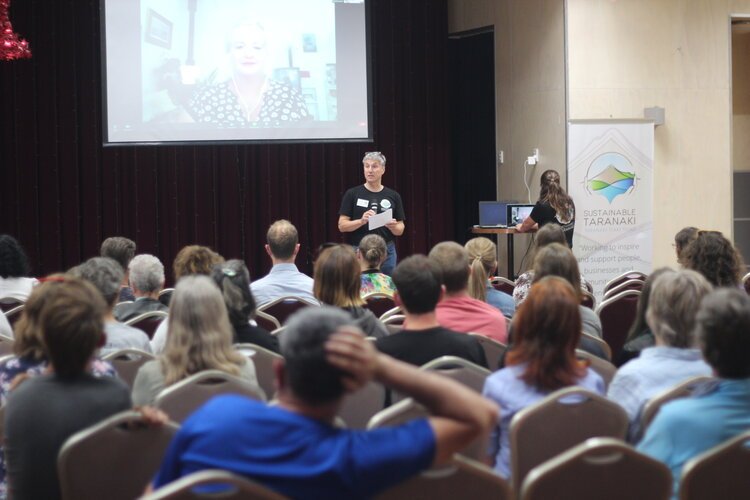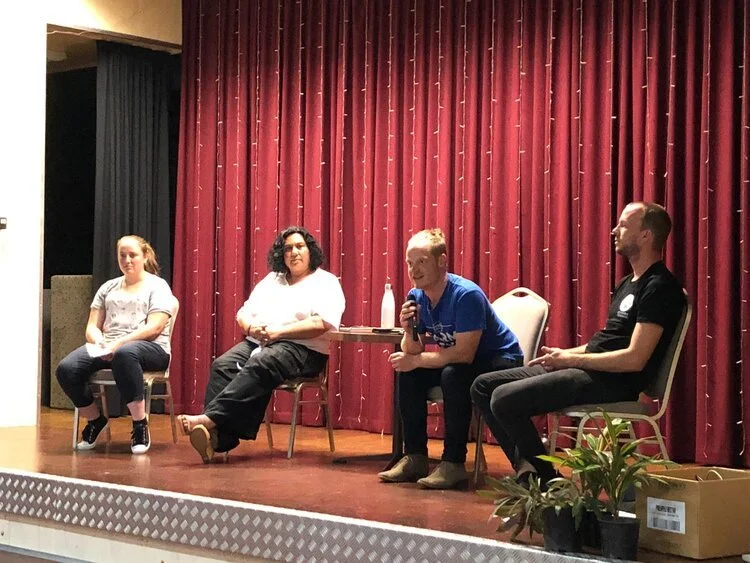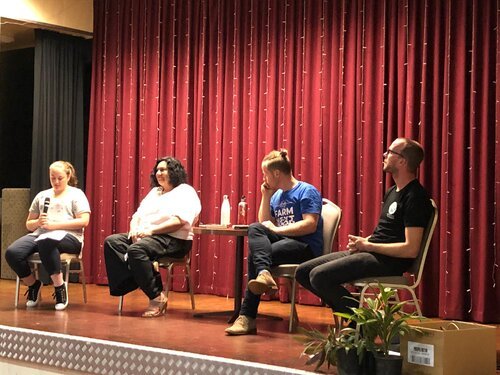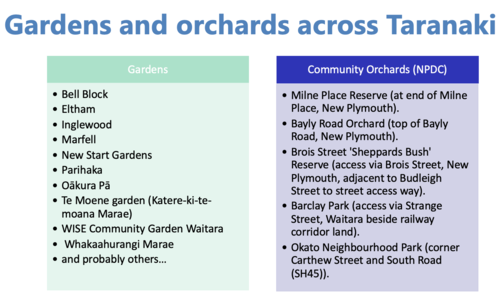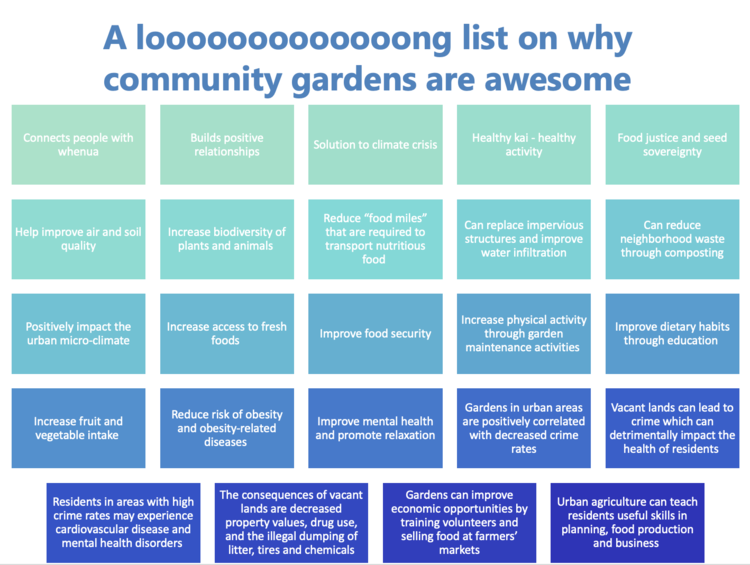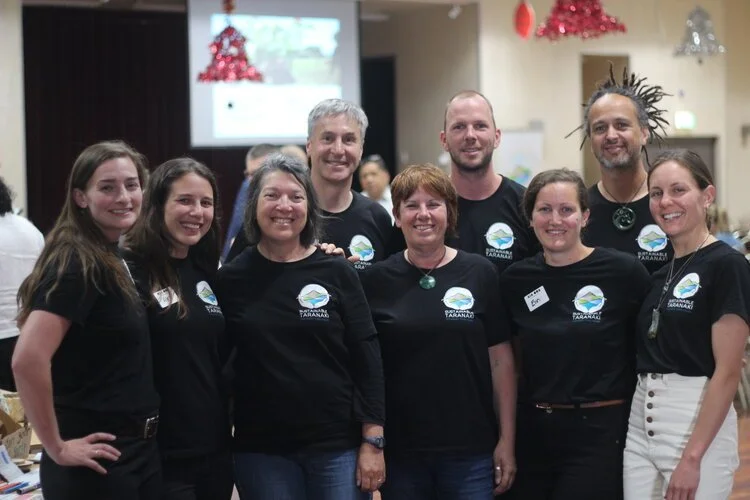Food Resilience Talks - event recap
How can we come together to address food security?
This was the main question that guided our actions in organising and promoting our Food Resilience Talks event on Thursday, 3rd of December. Given the importance of this topic and its growing relevance in the post-Covid context across Taranaki and Aotearoa, Sustainable Taranaki is now involved in the facilitation process to co-create a food secure communities plan for our region. This initiative aligns with our other food-related projects, especially our Community Gardens, Behavioural Change and Sustainable Backyards Trail projects.
The Food Resilience Talks was a great opportunity to gather not only relevant stakeholders that are already involved in food security efforts but also the general community who are interested in this topic.
It was an inspiring evening with over 60 attendees, plus over 600 people reached by our Live Facebook recordings.
Our guest speaker, Rachel Vogan, is an advisor on community gardening and ambassador for the food resilience space in Christchurch, a board member for Edible Canterbury / The Food Resilience Network and a keen gardener and community leader. She talked about how their community “got organised “after the earthquakes and started looking for new locations to grow food in the community. Have a look at the full talk here.
If there’s anything else you’d like to know about the work on community gardens, food resilience and Edible Canterbury, send us a message! We're happy to collect any questions you may have for Rachel so that we can put them together in a short interview or article.
After a quick intermission to have some kai and get to share ideas with other guests, we started the second part of the evening with the key presentations from our 4 local panellists:
- Carl Freeman (Freeman Farms)
- Pounamu Skelton (Hua Parakore educator)
- Urs Signer (Community Gardens project manager)
- Ashlee Andrews (Waitara High School student)
Carl discussed his experience growing food and starting a research project together with Massey University: Farming to Flourish and the Farm Next Door movement. He also went through some of the current initiatives in the region, such as Regenerative Agriculture, the Community Gardens project, Venture Taranaki’s Branching Out and the garden prescriptions initiative, and highlighted the role of food as connecting point for a community.
Healthy soils mean healthy people.
Pounamu’s presentation was rich with her own experiences growing up in the māra, learning how to grow kai and how to care for the land that feeds us. It was inspiring to learn about her journey on food sovereighnty in the Māori space and how she joined efforts in 2011 to create a verification system called Hua Parakore, that comprises the bases of tikanga Maori to grow excellent food. She also mentioned her experience working together with the Food Bank, the importance of making sure everybody has access to nutritious and healthy kai, and her upcoming projects engaged in a food security plan for Waitara.
For me, food resilience is not just today, it’s not 6 weeks, 6 years. It’s actually 60 years down the track and how I’m going to make sure that the whenua that my kai is growing on is going to maintain its mauri or its health.
Urs, as our Community Gardens project manager, encouraged us all to get our hands dirty and join the working bees at Marfell Community Garden, and to research other volunteering opportunities in gardens close to us. He mentioned that the 35 community gardens that Christchurch currently has is along the same population ratio as the community gardens in Taranaki. So it shouldn’t be a question of creating more gardens, but of growing more connections between everyone who is keen to get involved. There’s community gardens needing volunteers and help all over the region: in Eltham, Inglewood, Oākura, Bell Block, Te Maara Hapori o Parihaka and many more.
And the benefits of having community gardens is endless!
Ashlee, a senior student from Waitara High School (also known for her keen engagement with chooks) was one of the key actors involved in running the Sustainable Backyards Trail at her school. She shared her thoughts around the importance of food resilience for younger generations and the importance of incorporating gardening skills and knowledge in schools.
Their presentations were then followed by a lively discussion with everyone else in the audience. As we mentioned before, the conversation on food security in Taranaki has just begun, so we were glad to have such a rich exchange of ideas and points of view coming both from our panellists as from the audience, that was full with experts from different areas of the food system (producers, keen gardeners, educators, health experts, etc.). We wish we could have prolonged this conversation for longer but look forward to the next opportunity!
If you were unable to join us but are keen to listen to these presentations, you can do so on our Facebook page (unfortunately, the connection was not so good at the venue and the videos get cut from time to time, we ask for your patience):
https://fb.watch/2eC3uk6e6J/ Panellists 1st part
https://fb.watch/2eC4G7QJGi/ Panelists 2nd part (had connection difficulties with the first one!)
This event also had the presence of researchers from Massey University who are involved in the Farming to Flourish project. They brought a giant map of Taranaki and were engaging in conversations with guests around their role in the food system.
Special thanks to the community groups that joined us as stallholders at the event: Seedsavers Taranaki, Let’s Compost, New Plymouth Food Bank, Taranaki Timebank and NPDC’s Love Food / Hate Waste. And to our project funders: TSB Community Trust, Ministry for Social Development and New Plymouth District Council, as well as Mitre10 Mega New Plymouth and everyone else who supported us in this event.
Our awesome Sustainable Taranaki team that keeps on growing!


